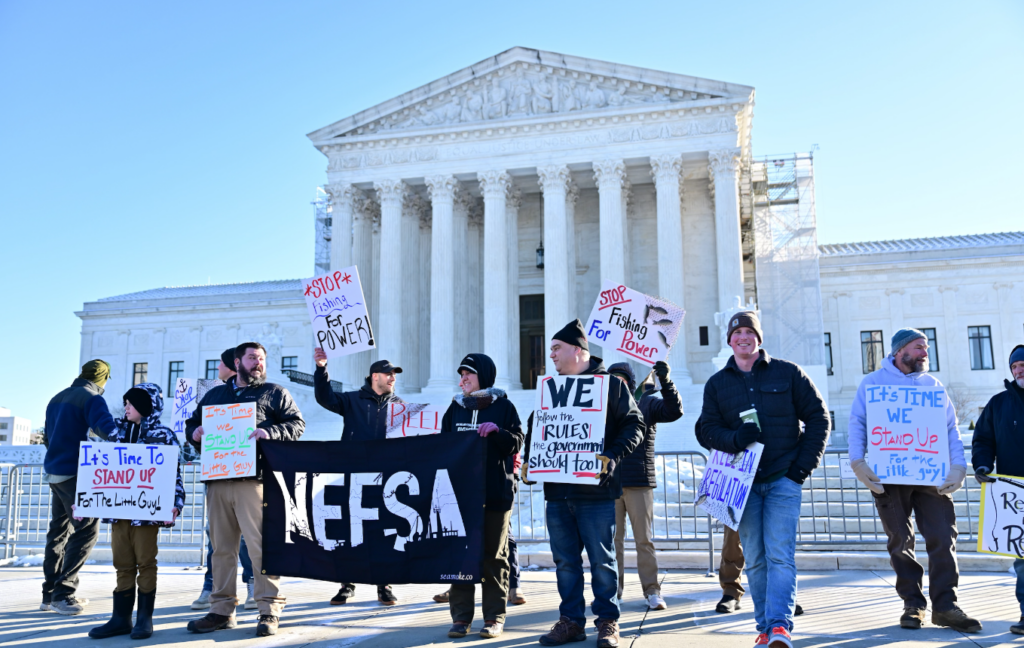Supreme Court Hears Fishermen’s Challenges to Costly Regulatory Authority of Feds
Mary Margaret Olohan /
The U.S. Supreme Court took up two cases Wednesday regarding the regulatory authority of the federal government as fishermen argue that government agencies are exceeding their authority by imposing costly mandates.
In Loper Bright Enterprises vs. Raimondo and Relentless Inc. vs. Department of Commerce, fishermen are challenging administrative law, dubbed “Chevron deference,” that asserts that when a federal statute is ambiguous about specific regulations, courts should defer to the implementing agency’s interpretation of the law.
The National Oceanic and Atmospheric Administration implemented a rule in 2020 forcing fishing companies (such as Relentless Inc.) to pay for federal observers to monitor the fishermen at sea on their own fishing boats—even though Congress did not give the agency authority to do so.

Supporters of the New England Fishermen’s Stewardship Association make their views known before the Supreme Court. (Photo: New Civil Liberties Alliance and Cause of Action)
The fishermen argue that the mandate violates the U.S. Constitution’s Article I, accusing the agencies of exceeding their statutory authority.
“Overregulation is imperiling the future of American fisheries and the maritime communities who depend on them,” Jerry Leeman, founder and CEO of the New England Fishermen’s Stewardship Association, said in a statement. “Worse still, fishermen have long struggled to fight back, because Chevron deference skews the legal process in the government’s favor. We thank the fishermen plaintiffs in this case, who are truly relentless.”
Paying for the monitors is also expensive, costing more than $700 a day, according to the New Civil Liberties Alliance (the nonprofit organization representing Relentless Inc.), which might often exceed the fishermen’s daily profits for herring, the species the boats and the North Atlantic fishery involved are mostly focused on.
“It is time for the Supreme Court to fish or cut bait on the Chevron doctrine,” said Mark Chenoweth, president of the New Civil Liberties Alliance. “This deference charade has gone on long enough. Executive agencies cannot be allowed to serve as judges in their own cases any longer.”
While Supreme Court Justices Clarence Thomas and Neil Gorsuch have called for curtailing Chevron deference, Fox News reports, Chief Justice John Roberts’ and Justices Brett Kavanaugh’s and Amy Coney Barrett’s views on the matter remain to be seen. Justice Samuel Alito is seen as entertaining some skepticism of Chevron deference. The three liberal justices, by contrast, are thought to see no constitutional problem with it.
In a press release, the New Civil Liberties Alliance argued that “when a federal judge defers to an agency’s interpretation of law, doing so denies due process of law to the entity opposed to the government in that litigation.”
“Employing such a deference also abandons a judge’s Article III duty of judicial independence,” the release asserts. “The logic of Chevron deference cannot withstand this devastating dual critique.”
Have an opinion about this article? To sound off, please email [email protected], and we’ll consider publishing your edited remarks in our regular “We Hear You” feature. Remember to include the URL or headline of the article plus your name and town and/or state.
